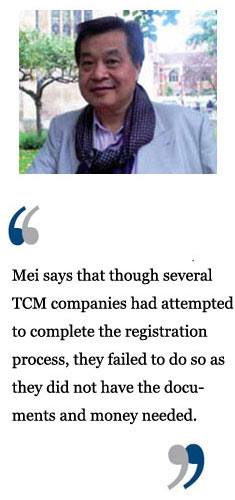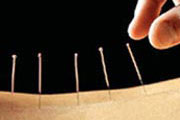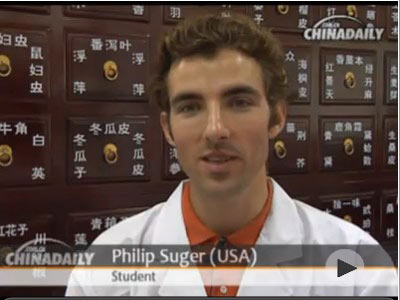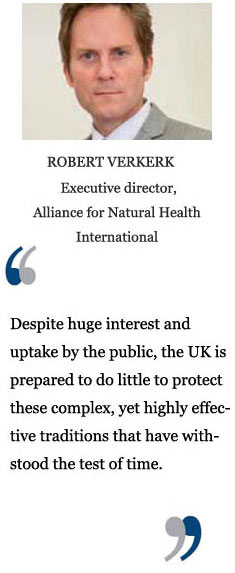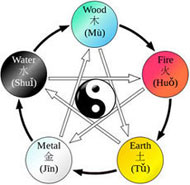|
 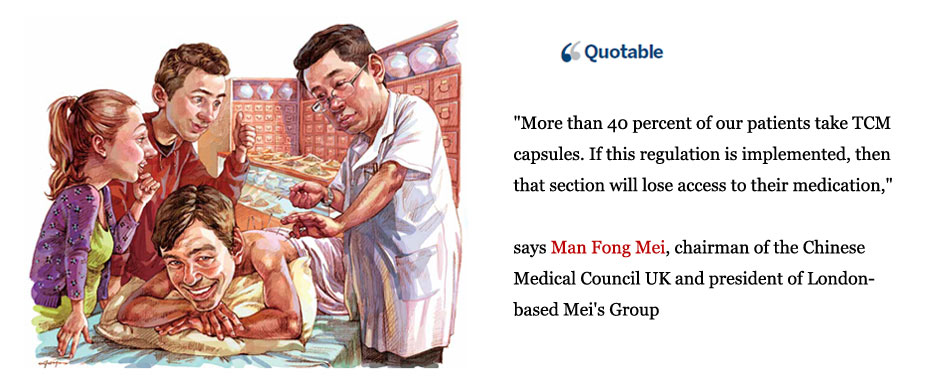 In London's Chinatown, a poster in Chinese urges customers to stock up on traditional and other patent Chinese medicines before an impending ban on patented TCM products from next year. According to the proposal the MHRA floated on July 9, the sale of all unlicensed manufactured herbal medicinal products will be halted in the UK from next year. The MHRA is a British government agency that is responsible for ensuring that medicines and medical devices used in the UK are safe.
The proposal is not targeted specifically at TCM. Andrea Farmer, MHRA's herbal policy manager, says: "The decision was taken on the basis of the Traditional Herbal Medicinal Products Directive,which stipulates that all the manufactured herbal medicines in the EU market should have a suitable product license." [More] Changing times The latest proposal will act as a knockout blow to the industry.If the MHRA proposal is implemented from next year,TCM practitioners will be in a fix, Mei says, as they can no longer prescribe time-trusted Chinese medications. Several TCM companies failed to complete the registration process, as they did not have the documents and money needed. ● The mandatory stability studies for end products are not easy for muti-herbal products. ●"Though some companies have the money and means to get the stipulated tests done, it is often difficult to satisfy Western authorities on the stability and toxicology test results." ●Applicants must evidence that the product has a 30-year safety record, including 15 years in the EU. But, TCM did not enter the EU market until the mid-1990s and were largely sold to EU customers as food supplements. [More] Regulatory concerns
Robert Verkerk, founder of Alliance for Natural Health, an international campaign working in the natural health field, says: "In 2008, the European Commission provided a report on traditional herbal products. In its last paragraph, it indicated that the EU directive was not suitable for traditional medicine systems like TCM." "We have been doing a lot of work with the European Parliament. We created a strong core group of 40-50 parliamentarians to canvass support for our cause. However, it is frustrating to note that a change of guard at the top has pushed the whole issue into the backburner."
Nick Pahl, CEO of the British Acupuncture Council, the leading self-regulatory body for the practice of traditional acupuncture in the UK, says it has been estimated that the demand for acupuncture treatment has almost doubled in the past decade to more than 4.5 million treatments every year.
 
 EFFICACY HELPS CHINESE MEDICINE WITH OVER EUROPEAN PATIENTS Looking at Rosemarie Austria lying on a bed at a TCM clinic in Antwerp, it is easy to believe that she is in a modern Western hospital. But a closer look shows that the 54-year-old Belgian is in a small three-bed clinic with her knees full of needles, a requisite for her second round of acupuncture treatment. "Although it hurts a little, the procedure has worked wonders for my dodgy knees," she says, adding that she was the first among her friends and family to try out TCM treatment. Austria says she was attracted to TCM as it was a therapy using herbs and techniques that have been used in China for thousands of years. "The severe pain in my knees was hampering my daily routine. One day I chanced upon the TCM clinic in Antwerp's Chinatown and decided to give it a try," Austria says. [Full story] 
Traditional Chinese medicine gets a commercial boost as demand from overseas rises steadily Old is proving to be gold for traditional Chinese medicine practitioners, with overseas patients seeking alternative therapies for chronic ailments, and expatriates, businesses and students embracing the ancient practice. TCM dates back more than 4,000 years and differs from Western medical practice in that it focuses more on preventive care and increasing resistance to disease. Though TCM has spread to many countries, it is now seeing a strong resurgence within China, buoyed by demand from medical tourists and expatriates. It took a big step earlier this year with dedicated TCM clinics for high-end foreign clients in major Chinese cities. 

|

|
By Robert Verkerk [The author is executive director, Alliance for Natural Health International, a non-government organization based in the UK.] LEGISLATION MAY HAMPER SPREAD OF TRADITIONAL CHINESE MEDICINE IN EUROPE
Steps taken by the European Union and the UK government have put a spoke in the wheels of traditional Chinese medicine, the healthcare system fine-tuned by China's scientists and clinicians over more than four millennia. Having handed sovereignty to the EU on crucial matters such as key aspects of healthcare and trade, the British government is now choosing to jettison or stall actions that could safeguard the future of TCM. This includes the recently stated intention by the British medicines regulator, the Medicines and Healthcare products Regulatory Agency, to terminate the "sell-through" of unlicensed herbal medicines by the end of this year. |
By Li Yun [The author is a professor at Nanjing University of Chinese Medicine.] LOCAL ALLIANCES CAN HELP CHINESE COMPANIES OVERCOME SOME OF THE REGULATORY HURDLES IN EUROPE Though the European Union came out with a directive that governs the sale and purchase of herbal medicines in 2004, it has been more of a detriment, rather than aid, for traditional Chinese medicine in Europe.
Issues for TCM became complicated in the UK earlier this year, after the Medicines and Healthcare products Regulatory Agency of the UK urged the public to stop buying unregistered herbal products, citing safety concerns. The regulator is also believed to be considering a ban on the sale of all unlicensed herbal products in the UK from next year. However, the MHRA's actions are against unregistered drugs, including patent Chinese drugs, but not against TCM as a whole. |
